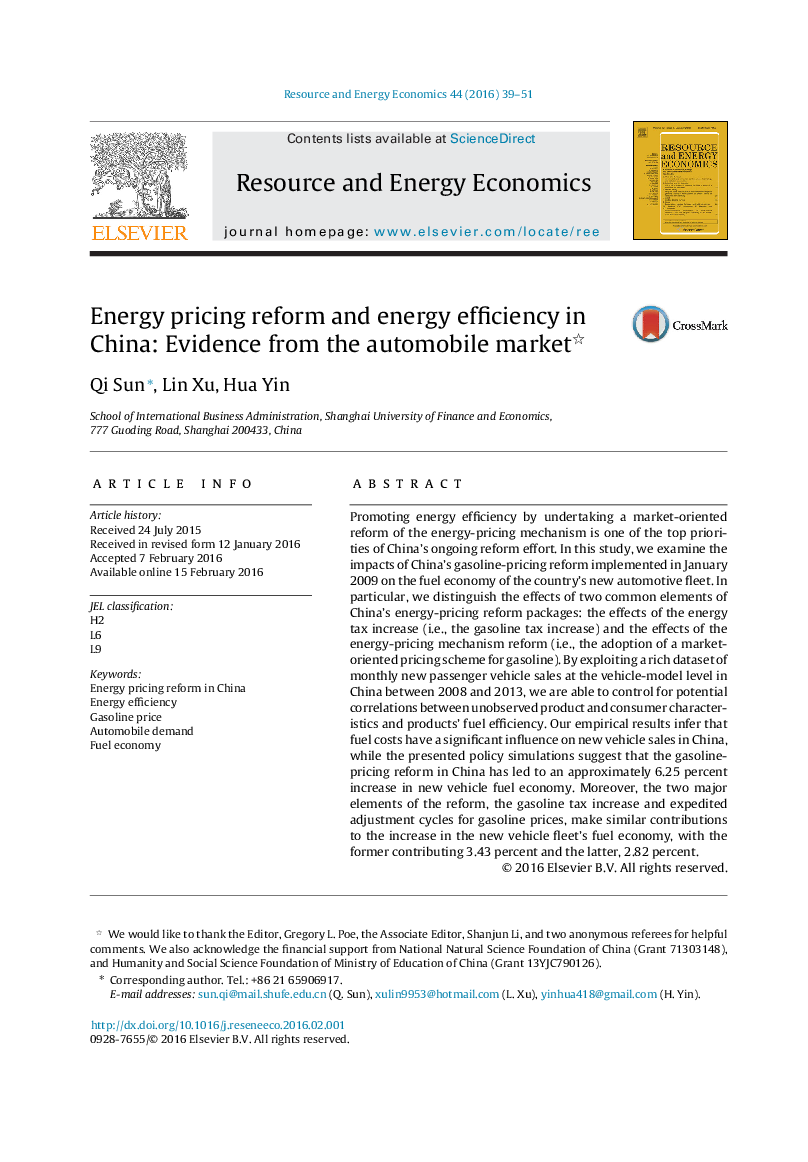| کد مقاله | کد نشریه | سال انتشار | مقاله انگلیسی | نسخه تمام متن |
|---|---|---|---|---|
| 7387467 | 1480677 | 2016 | 13 صفحه PDF | دانلود رایگان |
عنوان انگلیسی مقاله ISI
Energy pricing reform and energy efficiency in China: Evidence from the automobile market
ترجمه فارسی عنوان
اصلاح قیمت گذاری انرژی و بهره وری انرژی در چین: شواهدی از بازار خودرو
دانلود مقاله + سفارش ترجمه
دانلود مقاله ISI انگلیسی
رایگان برای ایرانیان
کلمات کلیدی
ترجمه چکیده
ارتقاء بهره وری انرژی با انجام اصلاحات بازار گرا مکانیسم قیمت گذاری انرژی یکی از اولویت های اصلی تلاش های اصلاحی در چین است. در این مطالعه، ما بررسی تاثیرات اصلاح قیمت بنزین چین در ژانویه 2009 بر اقتصاد سوخت ناوگان خودروی جدید کشور را بررسی می کنیم. به طور خاص، ما اثرات دو عنصر مشترک از بسته های اصلاحی قیمت گذاری انرژی چینی را تشخیص می دهیم: اثرات افزایش مالیات بر انرژی (یعنی افزایش مالیات بنزین) و تأثیر اصلاحات مکانیزم قیمت گذاری انرژی (یعنی پذیرش یک طرح قیمت گذاری بازار برای بنزین). با بهره گیری از مجموعه داده های غنی از فروش ماهانه وسایل نقلیه جدید خودرو در مدل خودرو مدل در چین بین 2008 و 2013، ما می توانیم برای همبستگی بالقوه بین محصول غیر قابل مشاهده و ویژگی های مصرف کننده و بهره وری سوخت محصولات را کنترل کنید. نتایج تجربی ما حاکی از آن است که هزینه های سوخت تأثیر قابل توجهی بر فروش خودروهای جدید در چین دارد، در حالی که شبیه سازی سیاست های ارائه شده نشان می دهد که اصلاحات قیمت گذاری بنزین در چین موجب افزایش تقریبا 6.25 درصدی مصرف سوخت سوخت خودرو شده است. علاوه بر این، دو عنصر اصلی اصلاح، افزایش مالیات بنزین و چرخه های اصلاح شده برای قیمت بنزین، سهم مشابه را در افزایش مصرف سوخت ناوگان ناوگان جدید، با 3.43 درصد و دوم، 2.82 درصد.
موضوعات مرتبط
مهندسی و علوم پایه
مهندسی انرژی
انرژی (عمومی)
چکیده انگلیسی
Promoting energy efficiency by undertaking a market-oriented reform of the energy-pricing mechanism is one of the top priorities of China's ongoing reform effort. In this study, we examine the impacts of China's gasoline-pricing reform implemented in January 2009 on the fuel economy of the country's new automotive fleet. In particular, we distinguish the effects of two common elements of China's energy-pricing reform packages: the effects of the energy tax increase (i.e., the gasoline tax increase) and the effects of the energy-pricing mechanism reform (i.e., the adoption of a market-oriented pricing scheme for gasoline). By exploiting a rich dataset of monthly new passenger vehicle sales at the vehicle-model level in China between 2008 and 2013, we are able to control for potential correlations between unobserved product and consumer characteristics and products' fuel efficiency. Our empirical results infer that fuel costs have a significant influence on new vehicle sales in China, while the presented policy simulations suggest that the gasoline-pricing reform in China has led to an approximately 6.25 percent increase in new vehicle fuel economy. Moreover, the two major elements of the reform, the gasoline tax increase and expedited adjustment cycles for gasoline prices, make similar contributions to the increase in the new vehicle fleet's fuel economy, with the former contributing 3.43 percent and the latter, 2.82 percent.
ناشر
Database: Elsevier - ScienceDirect (ساینس دایرکت)
Journal: Resource and Energy Economics - Volume 44, May 2016, Pages 39-51
Journal: Resource and Energy Economics - Volume 44, May 2016, Pages 39-51
نویسندگان
Qi Sun, Lin Xu, Hua Yin,
